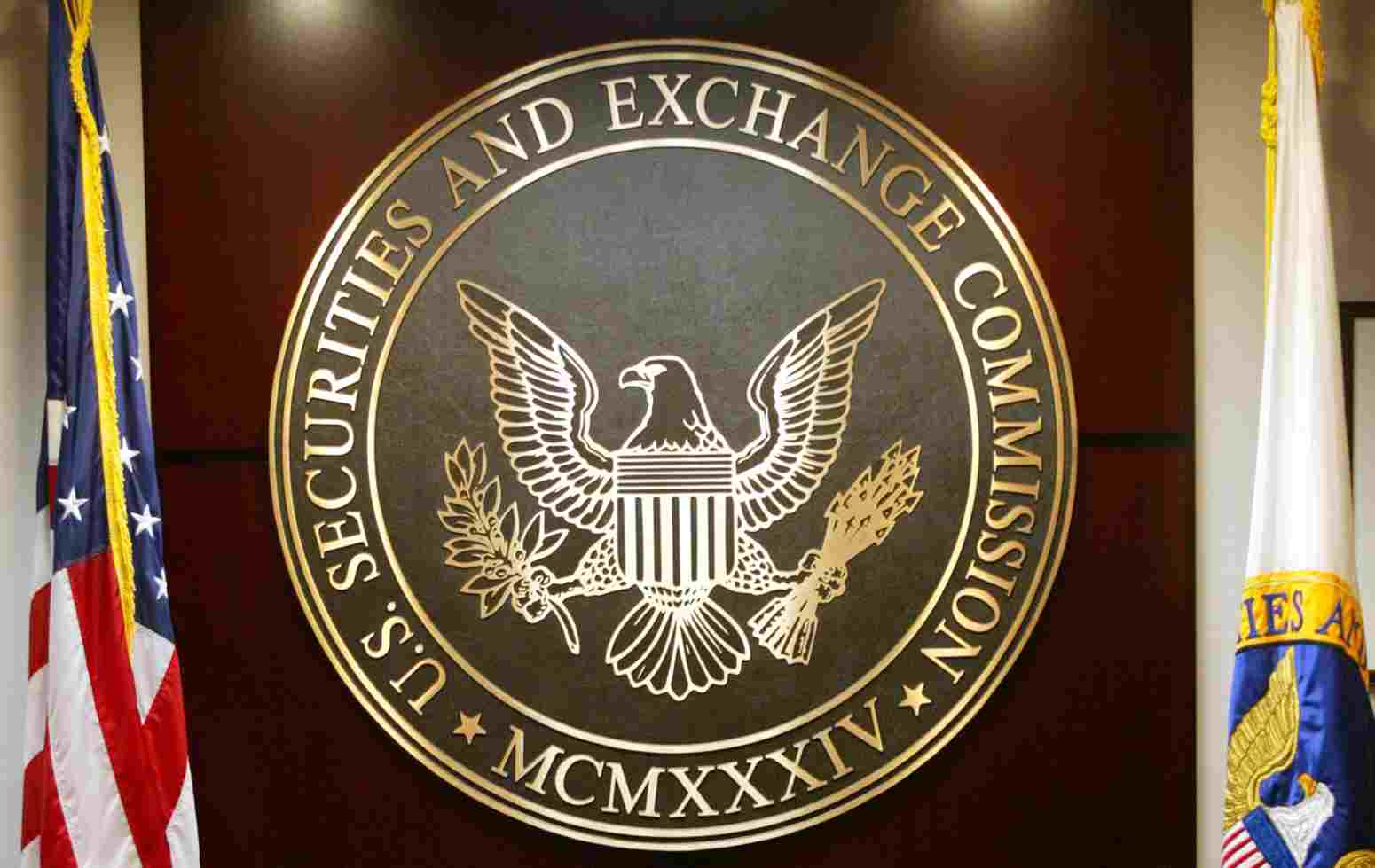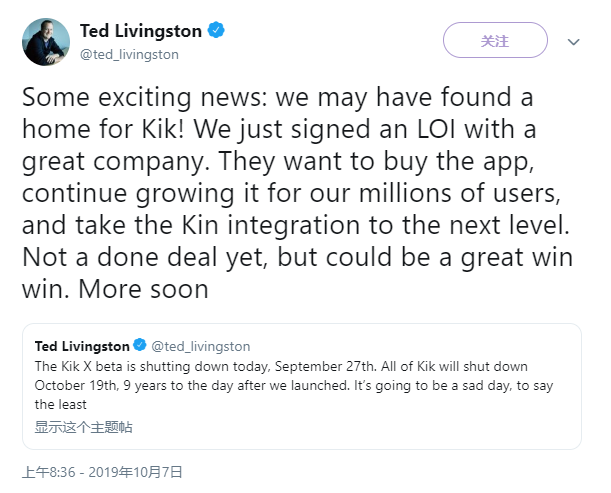The three social platforms are blocked by the currency: Why is US regulation so strict?
Text / one
Source / Muggle
On June 5, 2019, the US Securities and Exchange Commission (hereinafter referred to as the SEC) formally sued Kik, a social platform known as "Western WeChat," saying that it illegally issued $100 million of tokens in September 2017;
On October 12, the SEC received an emergency restraining order to stop the US social platform Telegram and its subsidiary Telegram Open Network (hereafter referred to as TON) to issue a $1.7 billion Gram token in the United States;
- Research Report | EU Blockchain Observatory: An Overview of the Legal and Regulatory Framework for Blockchains and Smart Contracts
- OKEx Mine Pool officially launched CRO lock service
- QKL123 market analysis | Fed interest rate cuts expected to strengthen; Britain's hard Brexit is uncertain (1017)
On October 16, according to Reuters, the Federal Reserve Board member (Leed Brainard) said that the social giant Facebook's cryptocurrency Libra plans to overcome "a series of legal and regulatory core challenges", Otherwise the first payment cannot be completed.
From the SEC to the CFTC to the Fed, US regulators are very unfriendly to social platforms that want to enter the cryptocurrency sector, even if the company is not operating in the United States.

Social platform
In 2009, a group of students from the University of Waterloo in Canada co-founded a mobile chat app called Kik, two years earlier than WeChat. With the opportunity of early admission, it attracted more than 1 million users to register in two weeks.
Ked's CEO and founder, Ted Livingston, has publicly pointed out that this product is characterized by pure chat, and can be imported into friends via the phone address book. He also compares Kik to Facebook:
“The reason why Facebook is so eager to acquire Snapchat is precisely because Facebook Messenger is not really a platform for chat.”

Kik chat interface similar to today's WeChat
In August 2015, Kik completed a $50 million Series D round of financing from Tencent, with a valuation of $1 billion and more than 240 million registered users.
However, while relying on the user's growth dividend to grow rapidly, Kik failed to translate the platform's traffic dividend into real benefits in a timely manner.
Kik's cryptocurrency program began in 2017, when Bitcoin and Ethereum prices hit record highs and ICO projects emerged in an endless stream. In June 2017, Kik announced that it was the first company to introduce the cryptocurrency Kin outside the cryptocurrency industry and plans to raise funds again through ICO. According to public information, this ICO financing made Kik nearly $100 million.
Ted has said:
"It's hard for us to compete with many companies in the Western world. They all have the same, they can sweep the world… ICO and the Internet world when the Internet was just budding is very similar. Some people make a lot of money, some people lose their lives, but there is always Filled with countless possibilities."
There are also Telegrams that launched ICO in 2017.
Telegram was founded four years later than Kik. In 2013, a Russian geek Pavel Valjeevich Dulov founded the “Encrypted WeChat” in Germany.
According to the Planet Daily article, Telegram's biggest feature is that it can encrypt the conversation content, and support the setting of chat record timing destruction, support for one-click deletion of accounts and data.
It is worth noting that Durov, who pursues privacy first, has rejected requests from Russian regulators to access Telegram users' chat content. This move made Telegram blocked by relevant Russian authorities, but it also attracted many privacy lovers and blockchain industry insiders.
Like Ted, Dulov also tried to raise funds through ICO in the 2017 cryptocurrency bull market to ensure the continued operation of Telegram.
However, Duluf's blockchain project did not openly finance. Until early October, Telegram officially announced its blockchain project TON and the toll-free Gram service terms to be publicly released on the official website.
It is worth mentioning that TON received $1.7 billion from 175 investors in private placements, which made Telegram the highest financing company in the history of blockchain and cryptocurrency.
According to public data, Telegram has more than 200 million monthly users in 2018, and now its downloads reach 365 million.
Telegram's $1.7 billion may be just a "small goal" in the eyes of Facebook, because the latter intends to "anchase a basket of legal tenders such as dollars and pounds" when it first announced its digital currency project. To engage in the ambition of a world-class digital currency project.
In June of this year, Facebook announced that it will launch the digital currency project Libra, and also established the Libra Foundation in Switzerland, which once attracted the participation of various industry giants including Visa, MasterCard and PayPal.
All three social platforms have to enter the blockchain and cryptocurrency areas, which will not only help them raise more funds at a faster rate, but also inject more positive factors into the industry.
However, what Ted, Dulov and Facebook CEO Mark Elliot Zuckerberg did not expect was that this year US regulators have repeatedly exerted their power to lead their blockchain and Encrypted currency projects have been severely hit.
SEC ruthless suppression
The first to be suppressed was Ted's Kik. On June 5 this year, the SEC sued Kik for illegally issuing digital token securities worth $100 million.
In a press release issued by the SEC, it alleged that Kik did not register the issuance and sale of tokens in accordance with US securities laws when selling tokens to US investors.
In fact, of the $100 million in financing that Kik received after ICO, $55 million was provided by US users.
In addition, the SEC also detailed Kik's other crimes, including Kik did not tell the investor's financial status when the ICO was conducted, the CEO Ted has been on the platform, the company has never been profitable.
At the time of the document, the Kik token Kin fell, falling by 25% in two hours.
However, in the face of the SEC's severe attack, Ted retorted: "The SEC's factual description of our ICO in 2017 is seriously misleading. We will tell the truth of the facts in court… We also hope that through this case, people can understand: The securities law should not apply to a currency that is used by millions of people in dozens of applications."
According to a previous article by CoinDesk, Ted pointed out in an interview that they have spent more than $5 million on this case.
The subsequent development of Kik has also been affected. At the end of September this year, Kik's parent company Kik Interactive announced that it will close the Kik Messenger social application and cut the number of employees from 150 to 19, and will focus on the cryptocurrency business Kin in the future.
According to the Muggle information, Kik Messenger will not shut down from here, but will change the club. Ted also pointed out in Twitter that Kik was acquired and signed a letter of intent.

Ted tweet screenshot
From this point of view, Ted seems to be planning to sell the Kik's way to get rid of the "trailer" that cannot be converted into cash, and to bet on the cryptocurrency.
Dulov and Zuckerberg, whose business volume is even larger, face more serious regulation.
On October 9 this year, the SEC announced that it has initiated a “temporary restraining order” for the Telegram Group, which is an unregistered digital token issued in the US and overseas, and its wholly-owned subsidiary TON Issuer.
The reason for the restrictions mentioned by the SEC in the document is basically the same as the reason for the restrictions on Kik in the previous article. It states that Telegram does not register the Gram token in accordance with the registration requirements of the Securities Act of 1933; in addition, Telegram does not. Provides investors with information about Gram tokens and Telegram business operations, financial status, risk privacy and management.
On October 12, the SEC announced that it would ban the issuance of TON tokens in the United States and sued the TON team.
After the SEC issued a regulatory order, TON also tried to image the Block.One and reached a settlement with the SEC by paying a fine, but this has not yet reached an agreement with the SEC; at the same time, the TON team also contacted private investors, asking Whether the Gram token can be extended for one year.
Because according to the rules, if the TON team did not publicly release the Gram token on the main website before October 31, the privately funded $1.7 billion must be returned to the investor.
According to the latest news from CoinDesk, Telegram has notified investors by email that the TON blockchain project will be postponed and the original deadline will be extended from October 31, 2019 to April 30, 2020. At the same time, investors need to sign a form to approve the extension before October 23. If most people choose not to sign, investors can get about 77% of the previous investment.
However, the current regulatory incident has not yet ended, and the SEC v. Telegram court hearing will be held on October 24.
Compared with the former two, Facebook's coin-issuing program is the latest, but the most restrictive regulatory attitudes – only a white paper, the establishment of a foundation, has met with unanimous opposition from regulators in the United States and around the world.
At the time of the Muggle submission, the regulatory bodies and government agencies, including the US Senate Bank, Housing and Urban Affairs Committee, the US House Financial Services Committee, and the SEC, have held hearings on the Libra project.
On October 23, Zuckerberg will also personally attend a hearing called "Reviewing Facebook and its Impact on Financial Services and Housing Sector", and there will be more officials on the Libra project to issue Zuckerberg. Martyrdom.
What's even worse is that the seven companies that said they want to join Libra's board of directors have announced their withdrawal from the project under the pressure of supervision, including credit card brand Visa, payment company MasterCard, e-commerce company eBay, payment system Stripe, Payment system Mercado Pago, payment system PayPal, Internet subscription service platform Booking.
Even Switzerland, which is the main body of the Libra project, has been toughened by Libra after receiving “threats” from US regulators.
Why is US cryptocurrency regulation so strict?
In fact, US regulators are not only strict with the cryptocurrency items of social platforms, but rather for all things related to cryptocurrencies.
From Block.One had to pay the SEC a fine of up to $24 million to resolve regulatory issues, and the New York State Attorney General’s Office (NYAG) alleged that the USDT issuer Tether was suspected of illegally diverting funds and defrauding investors for six months. The comprehensive information shows that the cryptocurrency regulatory environment in the United States is becoming more and more strict.
Even cryptocurrency companies that have been approved by regulators have chosen to "escape overseas."
According to the previous Muggle article "Circle Transformation: From Goldman Sachs, Baidu, to the abandonment of Bitcoin payments to stabilize coins", even in 2015, the first digital currency license BitLicense issued by the New York Financial Services Authority has been obtained. The Circle, still in the past, chose to transfer part of its business to Bermuda, which is more transparent and loose in the regulatory environment.
More than once, Circle founder Jeremy has publicly stated that there are many ills in US regulation: "The consequences of uncertainty and restrictive regulatory environment have led many digital asset projects and companies to register outside the US and prevent US individuals and businesses from getting relevant. Products and technologies."
However, behind the strict regulatory conditions that are full of restrictions, there is a rigorous logic of the regulator.
On the one hand, in order to protect the interests of the vast majority of people, the regulatory body must act as a "severe old father."
Along with the brutal development of the cryptocurrency industry, there have been incidents such as random issuance, stolen funds, and customer information leakage, and any of these three points are not conducive to participating in the ordinary US users in the cryptocurrency industry.
According to the previous article analysis of the chain tower think tank:
For the sake of profit, in the case of unsound regulation and opaque information, private companies will definitely choose to use super-stable coins, which will result in bad money expelling good money… further increase the risk of investors in the entire market. To make the market to a smaller scale of shrinking vicious circle. In this case, it is necessary to introduce public power at a high latitude to establish an access and disclosure penalty mechanism that can promote a virtuous circle of the market.
On the other hand, although there is a certain degree of independence in the cryptocurrency market, due to its large scale, it will still have a major impact on the real world, often “taking the lead and moving the whole body”.
In particular, the current cryptocurrency world still has a lot of money laundering, fraud, illegal misappropriation of funds, etc., which has also had a certain impact on the existing financial world, and also brought a series of problems such as network security. Therefore, the higher thresholds for the establishment of the regulatory authorities are conducive to the protection of consumer rights, and also give room for subsequent steadily relaxing restrictions.
But many people have pointed out that such an environment is too unfriendly to startups.
The CNN article believes that the regulatory environment for US cryptocurrencies is hurting US companies;
Coinbase's chief law and risk officer, Mike Lempres, said that it (the US cryptocurrency regulatory policy) does not have to be done in the past, and we need to be open to it;
Charles Scharf, CEO of Bank of New York Mellon, believes that regulatory policy is not clear, and I think this is one of the obstacles (the factor in the development of the cryptocurrency industry);
BK Capital CEO Brian Kelly said: Innovation in encryption technology is shifting elsewhere, and even Facebook has chosen Switzerland as the base for Libra. The United States may have lost the game;
And the US regulators, led by the SEC, CFTC, etc., will find a balance between the interests of users and start-ups in the future, and formulate more reasonable policies or laws and regulations to regulate the cryptocurrency industry. Muggles will continue to pay attention. .
Reference article:
1, ten years, "Western WeChat" Kik suddenly exited
http://tech.ifeng.com/c/7qFTt6poB79
2. On the eve of the coin, who buried the invisible bomb for the Telegram?
Https://36kr.com/p/5256153
3, heavy: the contradictions intensified, the SEC announced the prosecution of Kik
https://new.qq.com/omn/20190605/20190605A0NWQR00
Original article, unauthorized reproduction is prohibited.
We will continue to update Blocking; if you have any questions or suggestions, please contact us!
Was this article helpful?
93 out of 132 found this helpful
Related articles
- National team admission blockchain! The only internal measurement of the global infrastructure that controls China’s access rights
- Internet of Things + Blockchain Series: The Challenges of the Internet of Things
- Speed reading | Chain governance and DAO must read articles recommended
- Finance, passwords, communication, science fiction circles gathered, the world blockchain conference • Wuzhen second batch of guests exposed!
- Chinese government's blockchain “shopping list”: 57 purchasing units, 12 provinces and cities, Tsinghua University bought the first order
- Telegram plans to postpone the TON for half a year, if investors refuse to lose about 200 million US dollars
- Opinion: What is the correct profit model for blockchain projects?




